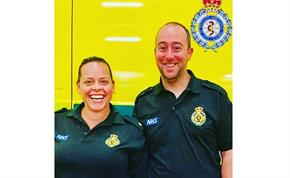
A HART paramedic who lost 2.5 litres of blood during a postpartum hemorrhage (PPH) after having a miscarriage at 15 weeks has shared a range of useful resources to help colleagues improve the care they provide in similar circumstances.
Laura Godfrey, who is based in Melbourn, discovered the guidance while looking for support following her loss in February. She now hopes to raise awareness of the signs which could point to a PPH and the steps colleagues should take, as well as of best practice for speaking to patients and their partners.
Laura said: “Following my own experience of a second trimester loss with severe PPH, I realised there was a gap in my knowledge for how best to manage these situations. I wanted to turn a negative into a positive so began researching the guidance which was available, which is when I found some really useful resources from the College of Paramedic and Miscarriage Association.
“I’ve been in the service 16 years and it’s the first time I’ve seen this sort of information. In our training, we cover early pregnancy loss and what to do if problems occur later in the pregnancy, but there is a real gap when it comes to the 13 to 24-week period. This information gives advice on everything from helping the parents to get a certificate for burial or cremation to how to speak sensitively to them. I know from personal experience that the patient will remember every word that is said to them in that situation, so this is vitally important.
“I would also like to raise awareness of postpartum hemorrhages, as even as a clinician I didn’t realise that was what was happening to me. When my partner and I arrived at the hospital the midwives weighed my clothes to estimate how much blood I had lost so they could be sure I’d had a PPH before I went to theatre. Their advice to crews attending a similar situation is to bring in any clothing or towels which have been used at the home as it will help them to ascertain whether the patient has had a PPH and just how serious it is.
“I’d encourage colleagues to take some time to have a look at the resources. Not only could they help us to improve the care we provide to patients who are experiencing something very distressing, but could also raise awareness of what staff should expect if they attend a second trimester loss, in turn helping to safeguard their own wellbeing and mental health.”
Resources:
Published 2nd June 2021